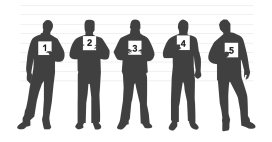
Prosecutors must protect fundamental rights in plea bargain cases
This brief by Fair and Just Prosecution (FJP) and Fair Trials offers clear guidelines for prosecutors, as well as recommendations for systemic change, to ensure that plea bargaining does not undermine the fundamental rights of accused people.
Around 97 percent of federal cases and 94 percent of state felony cases in the U.S. are resolved through plea bargaining, and it is widely accepted that this system too often reinforces and worsens existing problems in the criminal legal system, including racial disparities, overcriminalization, mass incarceration and wrongful convictions. Prosecutors can play a crucial role in addressing the misuse of plea bargaining, protecting due process and ensuring that justice is served.
One of the organizations’ key recommendations is ending, or at minimum capping, the “trial penalty,” which is the significant increase in sentence length that can result when a defendant declines a plea offer and instead exercises their constitutional right to a trial. The need to challenge this practice was highlighted recently by the case of Pamela Moses, who was sentenced to six years in prison for voter fraud. When asked about the severity of this sentence, the local elected prosecutor defended the decision, saying, “I gave her a chance to plead to a misdemeanor with no prison time. She requested a jury trial instead. She set this unfortunate result in motion and a jury of her peers heard the evidence and convicted her.” People accused of crimes like Moses should not fear harsher and unjust punishment simply for exercising their right to a trial.
Other recommendations include:
- Instituting policies to ensure that plea bargaining does not cause harsh, unjust and/or arbitrary case outcomes, including not using the threat of harsh penalties or enhancements to leverage a plea; holding plea offers open for as long as feasible; and not relying on plea bargaining to manage case volume or reduce caseloads.
- Increasing transparency and procedural safeguards, including providing access to all available evidence, especially any potentially exculpatory material, to defendants before requiring them to accept a plea offer; collecting and maintaining data on plea bargaining; and ensuring defendants have had time and
- Promoting and protecting avenues for justice and mercy, including by making sure charges reflect the underlying facts and circumstances (and not just all possible charges); having mechanisms in place for careful screening of cases and charges filed; creating procedures for defense attorneys to appeal to a supervising prosecutor if they think a charge or plea offer is unfair; considering collateral consequences (such as impact on immigration status) in plea discussions; and not requiring waivers of key rights (such as the right to litigate constitutional violations) as part of a plea deal.


